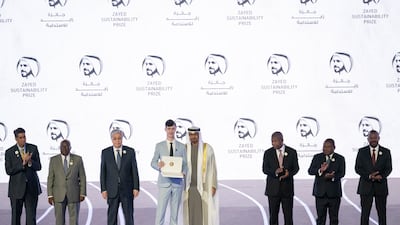Thirty-three projects aiming to transform lives and drive economic and environmental change around the world have been named as finalists in this year's Zayed Sustainability Prize.
Businesses, non-profit organisations and schools from 30 countries will be aiming to secure crucial funding at the $3.6 million international event.
The hopefuls will be judged in six categories – health, food, energy, water, climate action and global high schools – at the awards ceremony on December 1, during the UAE's hosting of the Cop28 climate conference.
Organisers received 5,213 entries for the awards, a 15 per cent increase in submissions from the most recent prize event, held in January.
The new Climate Action category, introduced in celebration of the UAE's Year of Sustainability and Cop28, attracted 3,178 entrants.
The annual prize was launched in 2008 to help champion sustainable projects making a difference in communities.
Dr Sultan Al Jaber, Minister of Industry and Advanced Technology, director general of the Zayed Sustainability Prize, and Cop28 President-designate, said the accolade has been a force for good, helping more than 378 million people in 151 countries over the past 15 years.
“The Zayed Sustainability Prize carries forward the enduring legacy of UAE's visionary leader, Sheikh Zayed, whose commitment to sustainability and humanitarianism continues to inspire us,” said Dr Al Jaber.
“This legacy remains the guiding light of our nation's aspirations, propelling us forward in our mission to uplift communities around the globe.
“Over the past 15 years, the prize has been a powerful force for positive change, transforming the lives of over 378 million people across 151 countries. We have incentivised solutions that are driving climate and economic progress in some of the world’s most vulnerable regions.”
The prize has delivered key support to 106 winners to date, helping to invest in innovative projects that have provided safe drinking water for 11 million people, access to reliable energy sources for 54 million homes and served up more nutritious food to 3.5 million people, organisers said.

“As global challenges continue to mount, our newest group of Prize finalists reveal the extraordinary efforts being made worldwide to meet the needs of the moment with purpose and innovation – inspiring hope for a brighter future,” said Olafur Ragnar Grimsson, chairman of the prize jury.
“Whether it’s restoring the ocean wilderness, using technology to ensure better, more sustainable farm yields, or driving change for individuals without access to affordable health care, these innovators are transforming our world.”
Finalists aim to build a better future
The finalists in the health category include a non-profit from Pakistan called the ChildLife Foundation, which offers vital telemedicine services, and an Indonesian organisation dedicated to delivering health care services to remote communities.
In the food category, Palestine's Gaza Urban and Peri-urban Agricultural Platform works to empower female farmers to bolster food security in their communities.
The energy category finalists include Husk Power Systems, a US company that uses artificial intelligence-enabled mini-grids offering 24/7 renewable energy to homes, microenterprises, health clinics and schools.
Eau et Vie, a non-profit based in France, was shortlisted in the water category for its work offering individual taps to the homes of impoverished urban residents, ensuring access to clean water in slum areas.
The inaugural climate action finalists include the Foundation for Amazon Sustainability, a non-profit from Brazil committed to putting in place projects and programmes that advance environmental conservation and empower indigenous communities to protect their rights.
The high school finalists are divided into six regions, with candidates judged on their pupil-led sustainability solutions.
The winners of the health, food, energy, water and climate action categories will each receive $600,000.
Each of the six winning Global High Schools receives up to $100,000.
Sustainability finalists
Health
- Alkion BioInnovations, France
- ChildLife Foundation, Pakistan
- doctorSHARE, Indonesia
Food
- Gaza Urban and Peri-urban Agricultural Platform, Palestine
- Regen Organics, Kenya
- Semilla Nueva, Guatemala
Energy
- Husk Power Systems, US
- Ignite Power, Rwanda
- Koolboks, France
Water
- ADADK, Jordan
- Eau et Vie, France
- TransForm, Denmark
Climate action
- CarbonCure, Canada
- Foundation for Amazon Sustainability, Brazil
- Kelp Blue, Namibia
Global high schools
The finalists have been divided into six regions.
The Americas: Colegio De Alto Rendimiento La Libertad (Peru), Liceo Baldomero Lillo Figueroa (Chile) and New Horizons School (Argentina)
Europe and Central Asia: Northfleet Technology College (UK), Presidential School in Tashkent (Uzbekistan) and Split International School (Croatia)
Middle East and North Africa: International School (Morocco), JSS International School (UAE) and Obour Stem School (Egypt)
Sub-Saharan Africa: Gwani Ibrahim Dan Hajja Academy (Nigeria), Lighthouse Primary and Secondary School (Mauritius) and USAP Community School (Zimbabwe)
South Asia: India International Public School (India), Kort Education Complex (Pakistan) and Obhizatrik School (Bangladesh)
East Asia and the Pacific: Beijing No 35 High School (China), Swami Vivekananda College (Fiji) and South Hill School, Inc (The Philippines)













